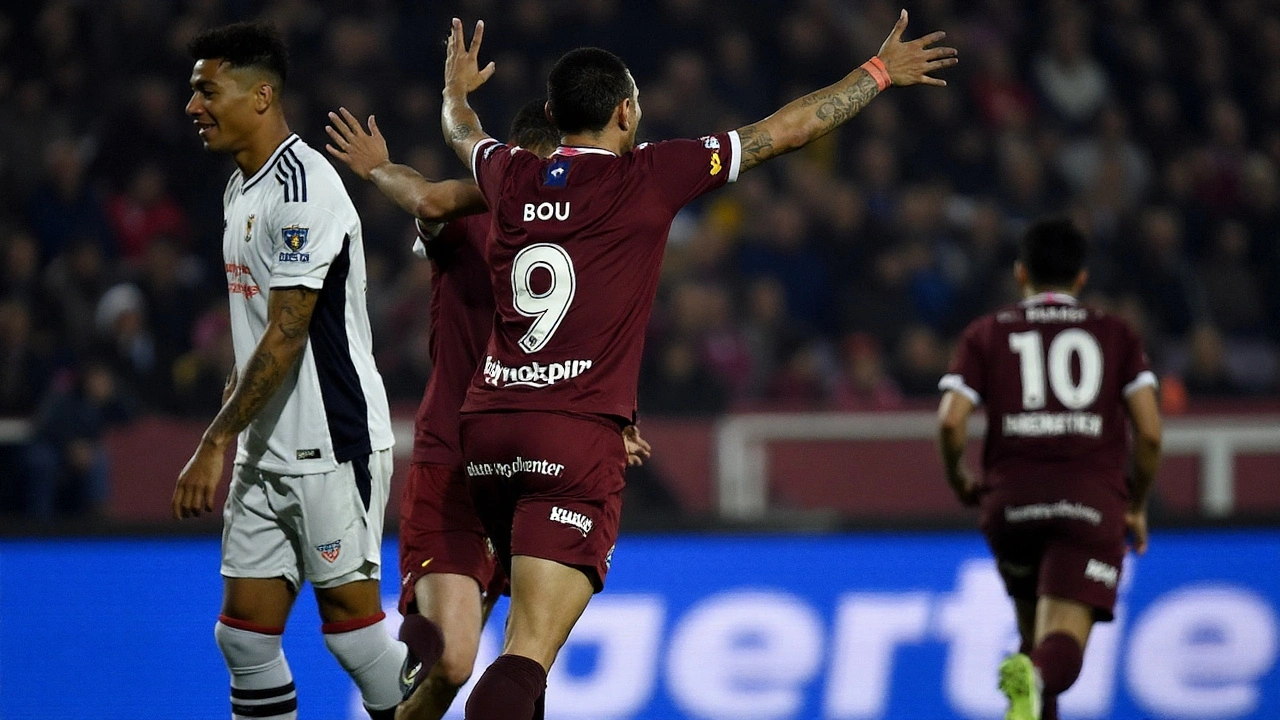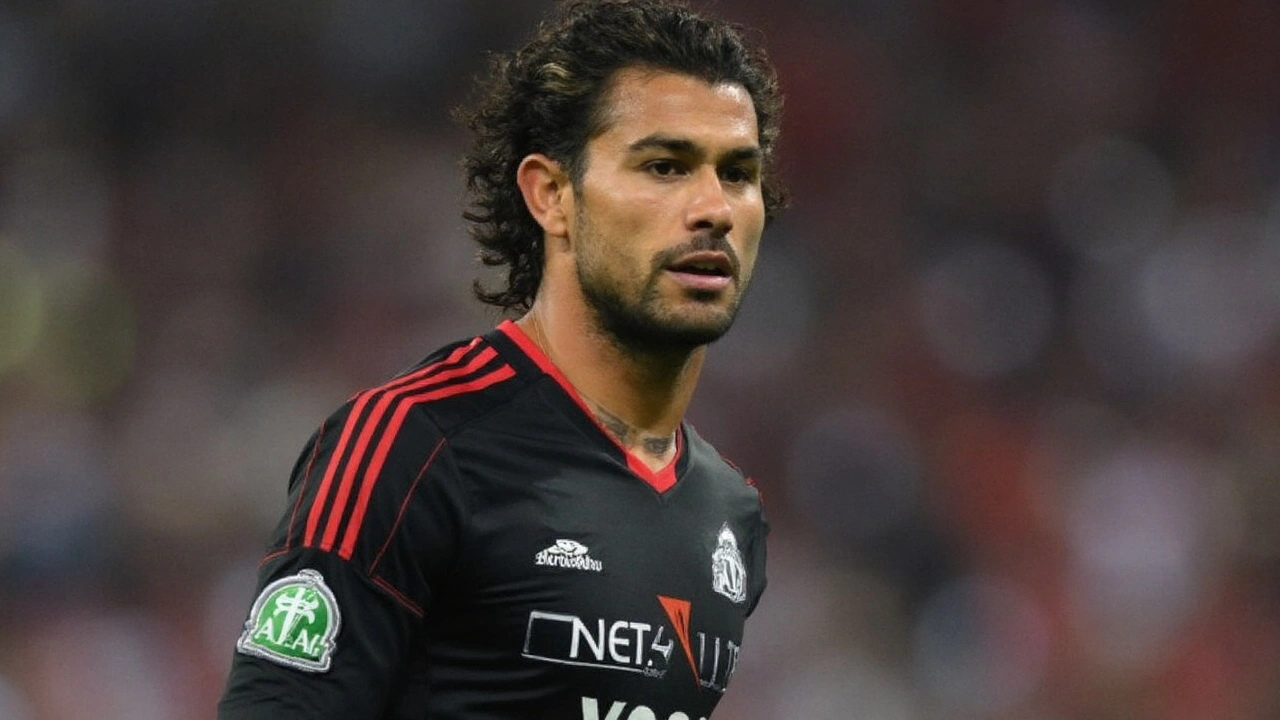24 Sep 2025
- 19 Comments
Match Overview
The second leg of the quarter‑final at the legendary Estádio do Maracanã turned into a tense chess match. Lanús already held a 1‑0 advantage after the first game in Argentina, so a draw was enough, but the Brazilian side pressed from the first whistle. In the 20th minute, Fluminense’s Agustín Canobbio slipped the ball past Lanús keeper and gave the home crowd a glimpse of hope.
Lanús didn’t panic. Under Mauricio Pellegrino’s disciplined setup, they stayed compact, forcing Fluminense to work hard for every inch. Possession numbers favored the hosts, but the visitors kept the lines tight and looked dangerous on the break. The breakthrough came in the 67th minute when a young rookie, 20‑year‑old Dylan Aquino, timed a run perfectly and slotted a low shot into the bottom corner, silencing the sea of voices in the Maracanã. That goal became the decisive moment, sending the Argentine team into the Copa Sudamericana semifinals.
Fluminense’s attack kept flirting with danger. Veteran striker Germán Cano rose for a header in the 81st minute, only to see the ball smash into the post. The rebound was cleared, but the near‑miss epitomised the frustration of the Brazilian side, who needed two clear‑cut goals to overturn the deficit.
Beyond the goals, the game had a few off‑field flashpoints. Late in the first half, a clash between a group of Lanús supporters and local police sparked a brief stoppage, delaying the start of the second half. The incident was quickly contained, and both teams refocused on the task at hand.
- 20' – Agustín Canobbio (Fluminense) scores first.
- 67' – Dylan Aquino (Lanús) equalises, clinching progression.
- 81' – Germán Cano (Fluminense) hits the post.
- Incidents involving Lanús fans cause a short half‑time delay.

Implications and Next Steps
For Lanús, reaching the semifinals marks a historic moment. The club has never gone beyond this stage in the Copa Sudamericana, and the back‑to‑back solid performances—first a home win, then a resilient away draw—show a side that can punch above its weight. Pellegrino’s tactics, especially the disciplined defensive block and quick counter‑attacks, have paid off. Aquino’s goal not only earned him a spot in the headlines but also signaled the rise of a new generation ready to carry the team forward.
Fluminense, on the other hand, faces a bitter end to what had been a promising continental run. Despite commanding the Maracanã and coming off a strong Série A campaign, they couldn’t create enough quality chances. Senior defender Thiago Silva showed his experience, organizing the back line, while goalkeeper Fábio made several crucial saves, yet the odds were stacked against them after the first‑leg loss.
Looking ahead, Lanús will meet a yet‑to‑be‑determined opponent in the semifinals. The draw pits them against either a South‑American heavyweight or a dark horse that survived a tight tie. Regardless of the draw, Pellegrino’s side will need to keep the same focus, especially in defending set‑pieces—Fluminense’s missed header showed how a single moment can swing a tie.
Fans are already buzzing about the upcoming clash. Social media threads highlight the tactical discipline of Lanús and debate whether the Argentine side can maintain its defensive solidity against a more attack‑oriented opponent. The club’s supporters, buoyed by the recent victory, are planning a massive travel contingent for the next match, hoping to bring the same passion they showed in Rio.
In the broader picture, this quarter‑final illustrates the growing competitiveness of South American club football. Argentine teams continue to prove they can out‑maneuver Brazilian giants, while Brazilian clubs still rely heavily on home advantage—something the Fluminense campaign reminded us of. The drama at the Maracanã, from the near‑miss to the fan incident, adds another chapter to the rivalry between the two nations.


linda menuhin
September 24, 2025Isn't it wild how Lanús just kept their cool in Rio? Like, they were the underdog but they played it like a chess game. Their defender line was stone solid, and that rookie Aquinó- sorry, Aquino- just slipped in that perfect finish. It kinda feels like life: when you stay chill, the universe gives you a lil' nudge. The fans and police scuffle? Just noise in the background. Everything else just fades when the ball hits the net. Props to Pellegrino for keeping the tactics simple yet deadly.
Jeff Abbott
September 27, 2025Lanús exploited Fluminense's desperate pressing like a textbook counter‑press scenario. Every time Rio tried to overload the midfield, Lanús swallowed the pressure and launched a lightning break. The Argentine side's discipline outclassed the Brazilian flair. Fluminense's near‑miss on the post shows how fragile their defense really is. It's a textbook case of strategic patience beating raw aggression.
Quinton Merrill
September 29, 2025The match was a solid showcase of tactical discipline 🤓. Lanús kept a compact shape, forcing Fluminense to waste energy. That equaliser by the rookie was a perfect example of timing in a counter‑attack. The post‑game discussions on set‑piece vulnerability are spot on, especially for teams relying on home advantage. It's a reminder that even giants can slip when they underestimate discipline.
Linda Lawton
October 1, 2025Honestly, the whole fan‑police clash is just another proof that football is a micro‑cosm of society’s decay. When people think a stadium is a battlefield, you know the values are corrupt. Lanús proved that staying true to the game’s spirit can overcome the chaos. Those who cheer for violence are the true losers.
Ashley Bradley
October 4, 2025Watching Lanús navigate that pressure reminded me of the ancient Stoic philosophers, who taught that virtue lies in disciplined response rather than uncontrolled passion. The Argentine side, under Pellegrino, embodied that principle by refusing to be rattled by the roaring Maracanã crowd. Their compact defensive block functioned like a well‑ordered mind, absorbing external chaos without losing internal equilibrium. When the ball was finally delivered forward, the counter‑attack unfolded with the precision of a logical syllogism: premise one-maintain structure; premise two-identify space; conclusion-execute the strike. Dylan Aquino's run was thus not a random sprint, but the inevitable result of a system that had primed the moment. It is fascinating how modern football tactics echo centuries‑old philosophical doctrines, turning a sport into a living laboratory for human behavior. The Brazilian side, in contrast, seemed to act on impulse, chasing the ball with fervor but lacking the strategic restraint that Lanús displayed. Their near‑miss on the post was a physical manifestation of a hasty decision, a moment where desire overrode disciplined calculation. Moreover, the brief altercation between supporters and police added a layer of societal commentary, suggesting that even within the arena of sport, the struggle between order and disorder persists. Lanús' ability to stay composed amidst that backdrop underscores a deeper truth: that true mastery involves navigating not just the opponent, but the surrounding turbulence as well. The fans' chants, the police presence, the electric atmosphere-all of these external variables could have disrupted a less focused team. Yet the Argentine side treated each distraction as background noise, reinforcing their concentration on the objective. In a way, their performance serves as a case study for anyone seeking to achieve goals under pressure. It validates the notion that preparation, humility, and a clear tactical framework can overcome raw talent when the latter is misapplied. The semifinals now loom, and if Lanús continues on this philosophical path, they may well rewrite the narrative about Argentine clubs in continental competition. Regardless of the next opponent, the lesson remains: discipline, patience, and a steadfast mind often triumph over passion without purpose.
Joe Delaney
October 6, 2025Totally agree Lanús showed better game management.
Ruben Vilas Boas
October 8, 2025Lanús stayed tight, hit the break, and earned their spot-solid work by the whole squad.
George Thomas
October 11, 2025The tactical discipline exhibited by Lanús aligns with contemporary defensive paradigms, illustrating the efficacy of a structured backline complemented by swift transitional play.
Michelle Linscomb
October 13, 2025Let's give credit where it's due: Lanús proved that calm execution beats frantic desperation, and that's a lesson worth embracing.
John McDonald
October 15, 2025From a performance‑analytics perspective, Lanús' Expected Goals (xG) ratio showcases a high‑efficiency conversion on low‑volume chances, underscoring the value of precision over volume in knockout fixtures.
Jordyn Wade
October 17, 2025What truly stands out about this encounter is the layered narrative of strategic foresight interwoven with momentary bursts of brilliance that together sculpted the final outcome
The disciplined defensive architecture laid by Pellegrino acted as a crucible where young talent could emerge unshielded by chaotic pressings
Each transition was calibrated, allowing the rookie Aquino to exploit the tiniest fissures in Fluminense’s defensive rhythm
The absence of frantic improvisation in favor of measured execution reflects a broader shift in South American football where tactical rigor is gaining prominence
Moreover, the incident with the supporters adds a sociocultural dimension that reminds us how stadium atmospheres can influence player psyche
Overall, this match serves as a microcosm of modern football’s balance between tactical discipline and individual flair
Zoe Birnbaum
October 20, 2025Wow, that was an electrifying game! The way Lanús kept their nerve is just awesome, and the crowd vibes were insane-can't wait to see what happens next!
Neha xo
October 22, 2025The match gave a clear picture of how tactical patience can neutralize an aggressive home side. I liked the balance of observation and action.
Rahul Jha
October 24, 2025Fact: Lanús' defensive block reduced Fluminense's possession by over 20%🔥💥
Gauri Sheth
October 27, 2025Honestly the feeling of watching Fluminense lose was terrible for the fans and the whole vibe was just off the mark i cant even
om biswas
October 29, 2025What a showcase of heartfelt Brazilian passion being crushed by a sterile Argentine system; if you love authentic football you'd be mad at this result.
sumi vinay
October 31, 2025Great game! Lanús' perseverance really paid off and it shows how optimism and hard work can lead to success.
Anjali Das
November 3, 2025Only a weak defensive mindset could let a team like Fluminense miss a simple header and still think they had a chance.
Dipti Namjoshi
November 5, 2025Seeing the tactical discipline of Lanús reminds us that football is as much about mental resilience as physical skill, and that's inspiring for any fan.